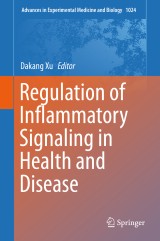Details

Regulation of Inflammatory Signaling in Health and Disease
Advances in Experimental Medicine and Biology, Band 1024
|
149,79 € |
|
| Verlag: | Springer |
| Format: | |
| Veröffentl.: | 18.09.2017 |
| ISBN/EAN: | 9789811059872 |
| Sprache: | englisch |
Dieses eBook enthält ein Wasserzeichen.
Beschreibungen
<p>This book discusses recent research in innate immunity, which has revealed a large number of receptors that sense the presence of microorganisms or cellular damage in tissues. In complex tissues, many of these sensing events occur simultaneously. Thus, the downstream signaling pathways need to be integrated so that an appropriate cellular inflammatory response can be initiated. In addition, the inflammasome defines the molecular and cellular processes of inflammation in response to microbial infection. Previous data suggested that regulation of inflammasomes is mediated by microbes, but inflammasomes also have antimicrobial functions. Increasing evidence in mouse models, together with human data, strongly implicates an involvement of the inflammasome and uncontrolled inflammation in the initiation and progression of diseases with a high impact on public health. </p><p> </p><p>The book reviews novel aspects of functional genomics, epigenomics, transcriptomics, post-translat</p>ional modifications, microbiome and immunometabolism in order to understand inflammatory signaling and responses, covering recent findings on the mechanisms underlying the regulation of inflammatory responses to pathogens, dysregulation of these responses in inflammatory disease, and the use of such mechanisms to boost or subdue the inflammatory response. Bridging the gaps in understanding between the fields of human and mouse immunology, it provides valuable insights into inflammatory-mediated disease and immune defense. Such innovative perspectives in both basic and clinical research promote the translation of knowledge to the clinic.</p>
<b>Activation of the innate immune receptors: guardians of the micro galaxy.- </b><b>Post-translational modification control of inflammatory signaling.- </b><b>Emerging roles for </b><b>epigenetic programming in the control of inflammatory signaling integration in heath and disease.- </b><b>Roles of HDACs in the Responses of Innate Immune Cells and as Targets in Inflammatory Diseases.- </b><b>Inflammasomes in the Gut Mucosal Homeostasis.- </b><b>Microbial factors in inflammatory diseases and cancers.- </b><b>cGAS-STING activation in the tumor microenvironment and its role in cancer immunity.- </b><b>TLR Agonists as Adjuvants for Cancer Vaccines.- </b><b>Telomere damage response and low-grade inflammation.- </b><b>The development and diversity of ILCs,NK cells and their relevance in health and diseases</b>
<p>Dr. Dakang Xu is Professor at Shanghai Jiao Tong University and Institute of Ageing Research, Hangzhou Normal University, China. The main focus of his research team is to used a combination of genetically modified mouse models of disease, cell signalling, bioinformatics </p>analyses and clinical applications, to understand the mechanisms of regulation of epigenetic factors in inflammatory signalling. He has also studied how modulation of the activity ofthose key factors affects the inflammatory response and tumour progression, through the function of immune cell subsets and cytokines in cancer and inflammatory diseases. This work has led to 50 peer-reviewed publications in high impact journals, including <em>Nature Immunology</em>, <em>Immunity</em>, <em>Nature Communications</em>, <em>PNAS</em> and <em>Cancer Research</em>. <p></p>
<p>This book discusses recent research in innate immunity, which has revealed a large number of receptors that sense the presence of microorganisms or cellular damage in tissues. In complex tissues, many of these sensing events occur simultaneously. Thus, the downstream signaling pathways need to be integrated so that an appropriate cellular inflammatory response can be initiated. In addition, the inflammasome defines the molecular and cellular processes of inflammation in response to microbial infection. Previous data suggested that regulation of inflammasomes is mediated by microbes, but inflammasomes also have antimicrobial functions. Increasing evidence in mouse models, together with human data, strongly implicates an involvement of the inflammasome and uncontrolled inflammation in the initiation and progression of diseases with a high impact on public health. </p><p> </p><p>The book reviews novel aspects of functional genomics, epigenomics, transcriptomics, post-translat</p>ional modifications, microbiome and immunometabolism in order to understand inflammatory signaling and responses, covering recent findings on the mechanisms underlying the regulation of inflammatory responses to pathogens, dysregulation of these responses in inflammatory disease, and the use of such mechanisms to boost or subdue the inflammatory response. Bridging the gaps in understanding between the fields of human and mouse immunology, it provides valuable insights into inflammatory-mediated disease and immune defense. Such innovative perspectives in both basic and clinical research promote the translation of knowledge to the clinic.</p>
Covers cutting-edge research in innate immunity Reviews novel mechanisms in regulation of inflammation, such as microRNA and epigenetics Discussing newly emerged innate lymphoid cells, which bridges innate and adaptive immunity Written by experts in this field

















